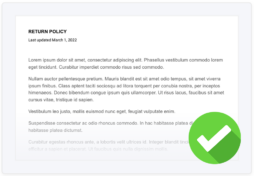Whether your business offers returns or not, you need to make your stance clear in your refund and return policy. It may be in your best business interests to implement an all sales are final policy (also known as an all sales final policy) for certain products, such as discounted or customized items.
This guide will go over what an all sales final policy is, whether you can have one, and how to write an all sales are final policy that complies with consumer laws.
What Is an All Sales Are Final Policy?
An all sales are final policy is a statement notifying customers that there are no returns, refunds or exchanges for certain items or services once purchased.
It’s similar to a no refund policy, and can either be featured in a business’s return policy or hosted on a separate page.
Most commonly, an all sales final policy is applied to:
- clearance sale items
- customized items
- non-returnable items
Although final sale items are typically not eligible for returns, there may be exceptions. For example, you should accept returns and issue refunds if items are damaged during transit. Some refund laws provide customers with remedies if their items are defective.
What Does “Final Sale” Mean?
Final sale is when you heavily discount items in order to clear them from your inventory.
Non-returnable items can also be considered final sale, such as:
- Digital content
- Personalized items
- Toiletries
- Single-use products
As a result, final sale items typically cannot be returned, exchanged, or refunded unless there are defects. Such items need to be specified in your all sales final policy.
Can I Have an All Sales Are Final Policy?
Yes, you can have an all sales are final policy, as there aren’t any refund laws that expressly prohibit them. However, depending on where you live, there may be refund laws that require refunds or returns in certain circumstances, even if you have an all sales final policy in place.
Let’s take a look at some examples of refund laws from different countries.
US
All sales final policies aren’t prohibited under any federal or state laws in the US. Many state laws allow merchants to set their own return and refund policy, and as long as the policy is clearly written and displayed, merchants don’t have to issue returns or refunds unless items are defective.
California has stricter refund laws than most of the US. They mandate retailers with an all sales are final policy to display a conspicuous sign, otherwise they must honor return and refund requests.
UK
All sales final policies are allowed under UK laws, but stores must allow returns or refunds if items are defective, don’t match their description, or fail to perform as described.
Furthermore, online, mail, and telephone order customers have the right to cancel their order for a limited time even if the goods are not faulty.
Australia
Australia consumer laws allow merchants to have all sales are final policies. However, as no refund policies are illegal in Australia, stores must honor replacement or refund requests for defective products, even if there’s an all sales final policy in place.
How to Create an All Sales Are Final Policy
To create an all sales are final policy, follow these steps:
- Add an all sales final section to your return policy, or create a separate page.
- Specify which items the policy applies to.
- Outline the eligibility requirements and limitations of the policy.
- State any exceptions.
- Add up-to-date contact information, so customers can contact you regarding your policy.
When writing your final sale policy, make sure it’s comprehensive, but avoid legalese so that it’s easy to understand for the average customer.
Use Termly to Create a Return Policy
Here’s how you can use Termly’s generator to easily create a comprehensive return policy that outlines everything you need:
Step 1: Go to Termly’s return policy generator.
Step 2: Answer our prompts and questions, and go through all of the steps until you reach “Final Details.”
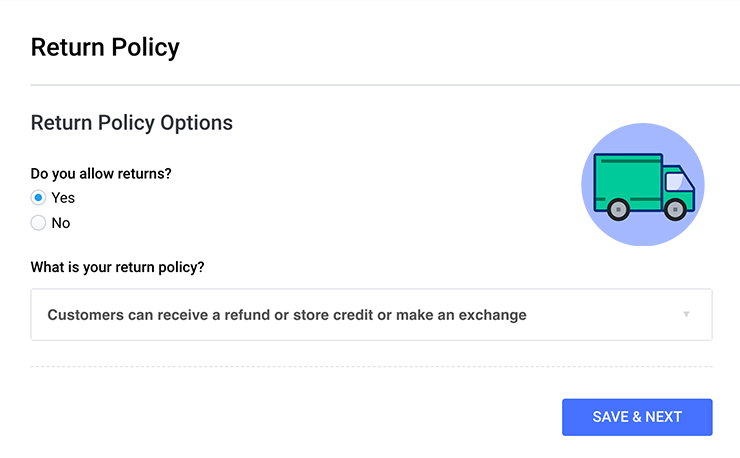
Step 3: Once you’ve filled in everything and you are satisfied with the preview, click “Publish.” You will then be prompted to create an account on Termly so you can save and edit your return policy further.
Creating All Sales Final Policies for Online Stores
All sales final policies for online stores tend to be more detailed than in-store ones, as there may be unpredictable issues that arise from online purchases.
Customers can only rely on online descriptions of products, and they won’t know the quality of products until after purchasing. If you sell products online, make sure your policy addresses all final sale exceptions, such as defective products.
For example, Wayfair’s return policy lists items that are non-returnable, but makes exceptions if items are damaged or defective.
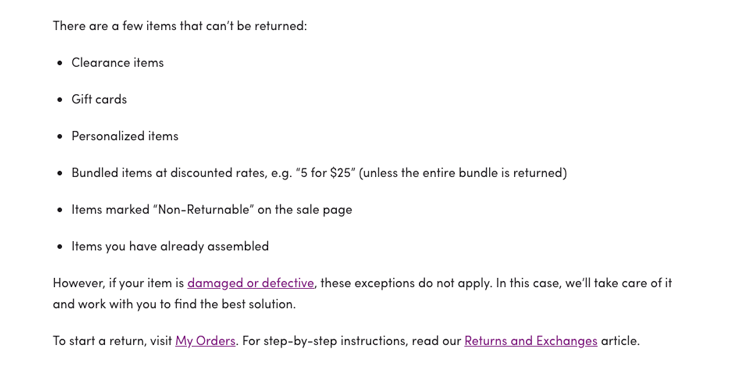
Creating Your All Sales Final Policy
If you’re ready to post an all sales are final policy now, you can easily create a return policy using our refund and return policy generator, which allows you to add details about your all sales are final policy.
In the “Exceptions” section of the generator, specify which items are not eligible for returns. Fill in details about your return process and create additional clauses for your policy if needed.
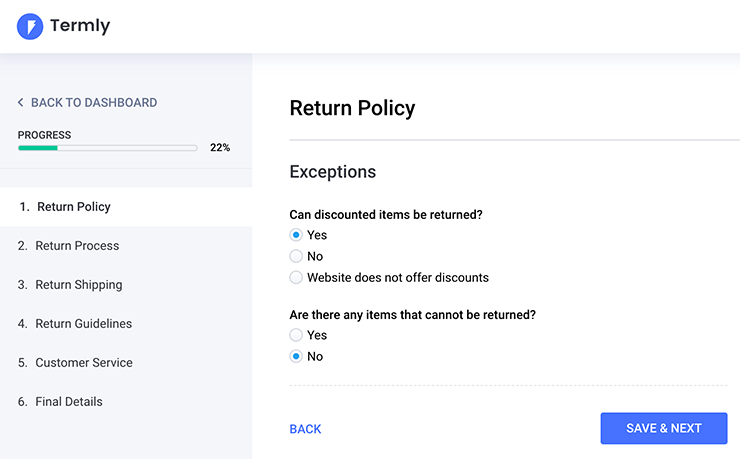
Once your custom return policy has been generated, upload or paste the policy onto a webpage and link to that page in prominent locations on your website.
Where to Put an All Sales Are Final Policy
In order to enforce your all sales final policy, it’s crucial to create readable all sales final signs and display them in conspicuous places, as required by some refund laws.
- If you have a physical storefront: place all sales are final signs near cash registers or on item labels.
- If you own an ecommerce site: link to your all sales are final policy on checkout pages, in the terms and conditions, and in the website footer.
Whether you own a physical or online store, customers will appreciate you having a well-displayed final sale policy.
All Sales Are Final Policy Examples
All sales are final policies should outline the conditions of the sale, and state which items are non-returnable or non-refundable. Take a look at some all sales final policy examples from different stores to get inspiration for your policy.
Aki Home
Furniture store Aki Home’s refund policy addresses final sale items in the “Exceptions” section of their return and refund policy. They state that clearance items, floor models, and “as is” items are considered final sale and can’t be returned, refunded, or exchanged.
Their policy also features a “Warranty” section that explicitly states store warranties don’t apply to merchandise marked as floor models or “as is.”

Like this example, you should list the items that are considered final sale, so customers are aware before making purchases. If you sell products marked “as is,” address how that affects the products’ warranties in your all sales final policy.
Michael Kors
Michael Kors’ return policy has a dedicated final sale section. It specifies that they don’t accept returns or exchanges for discounted products. The policy also specifies types of items that are considered final sale, including swimwear, underwear, and altered merchandise.
If you sell products that cannot be returned due to safety or hygiene issues, such as undergarments, medicine, or toiletries, categorize them as final sale products.
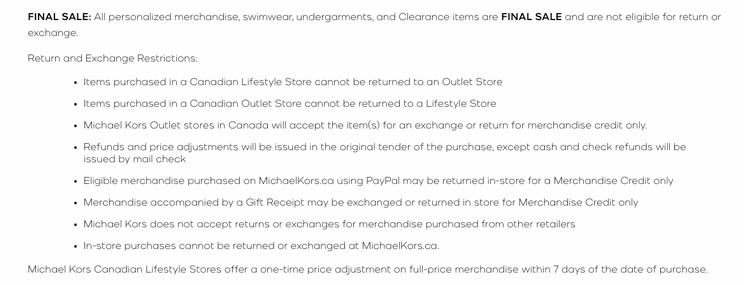
As the example shows, personalized or altered items are also typically considered final sale, as they’ve been tailored for a customer.
Blizzard
Video game company Blizzard’s terms of sale includes its return policy. Its final sale policy is brief and straightforward, stating that all digital content and services are final sale and not eligible for refunds unless mandated by law.

Digital products are often considered final sale as they can’t be returned once they’ve been downloaded. However, like this example, you should take into account that there may be exceptions to final sale policies depending on refund laws that apply to your jurisdiction.
Summary
By now you should be familiar with what an all sales are final policy is and what to include in one. Be sure to specify which items your all sales final policy applies to, and the terms for returns or refunds.
Review the consumer laws that apply to your business to ensure your all sales final policy is compliant.
Start creating an all sales are final policy for your business using our refund and return policy generator or return policy template.
A well-written, clearly-displayed all sales final policy will make your policy easier to enforce and make the purchase experience more convenient for customers.
![]()
Try Termly for Free!
Termly is a an easy-to-use solution for data privacy compliance and consent management.

We know that keeping up with complex data privacy laws can be confusing and time-consuming; that’s why we do the hard work for you!
Try our legal policy generators and cookie consent management solutions for FREE!


